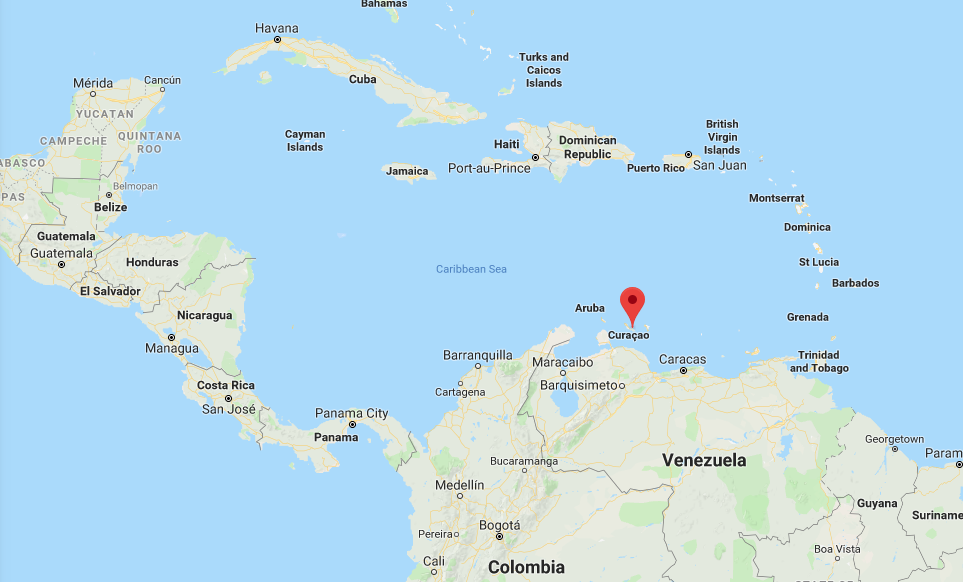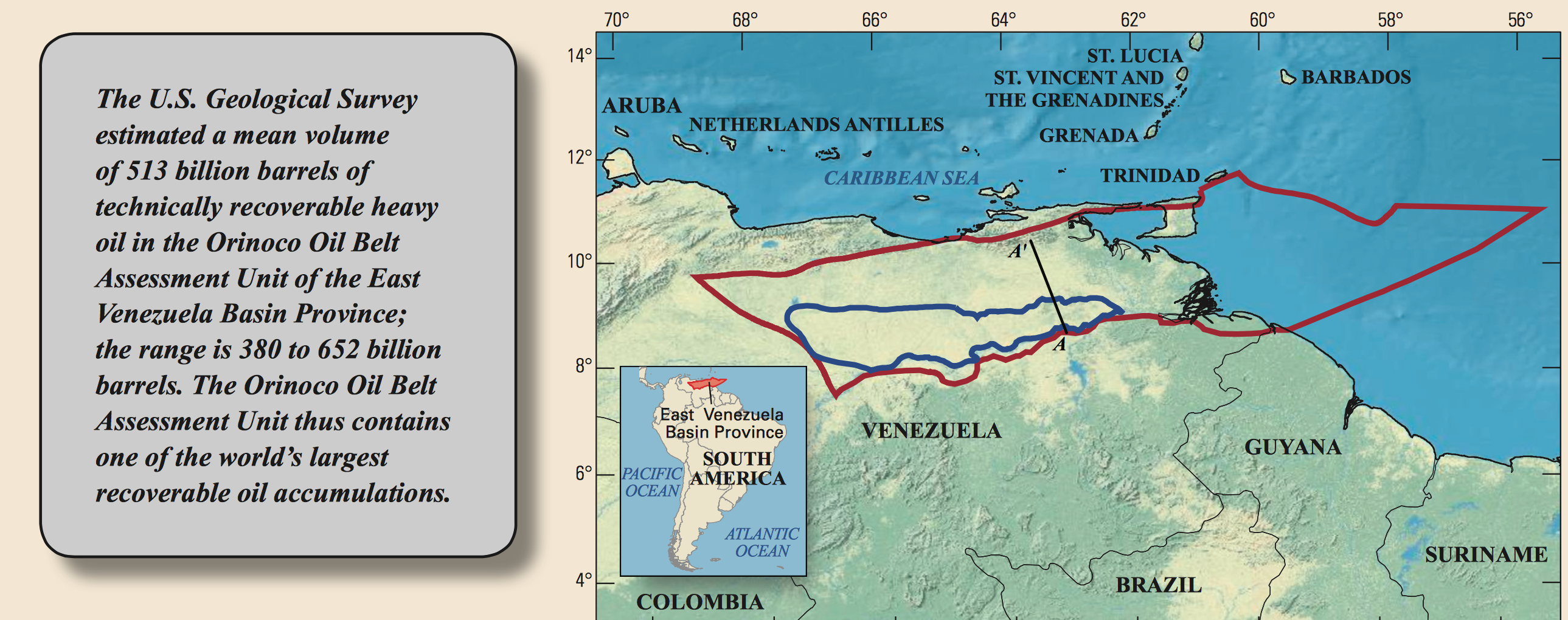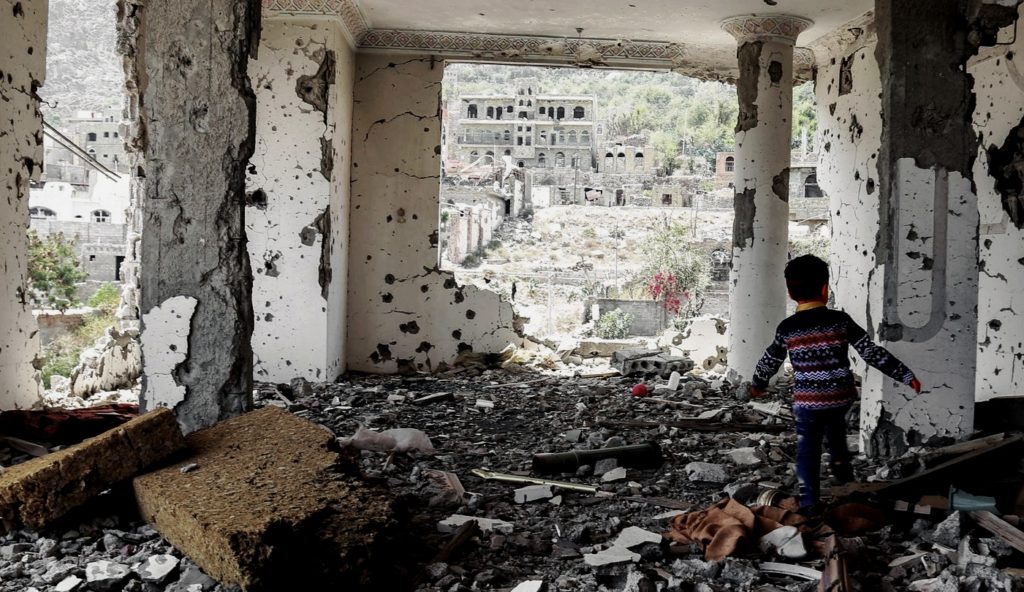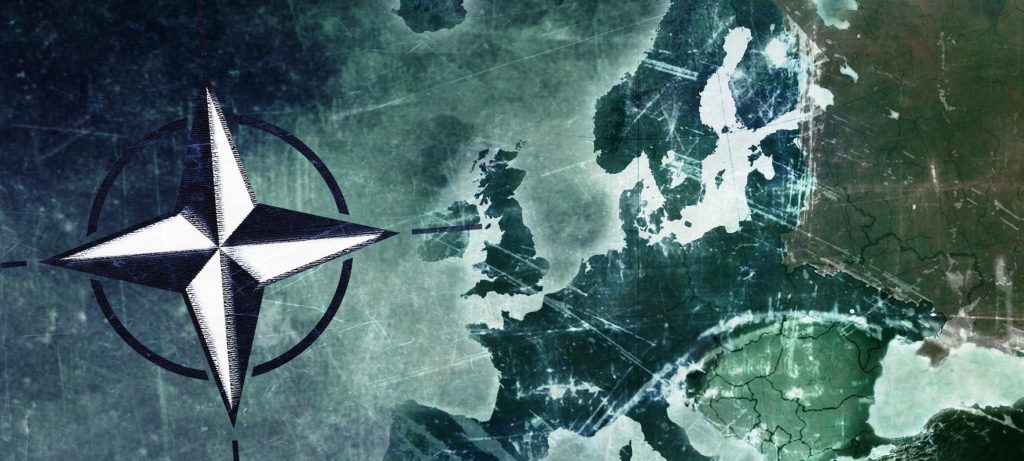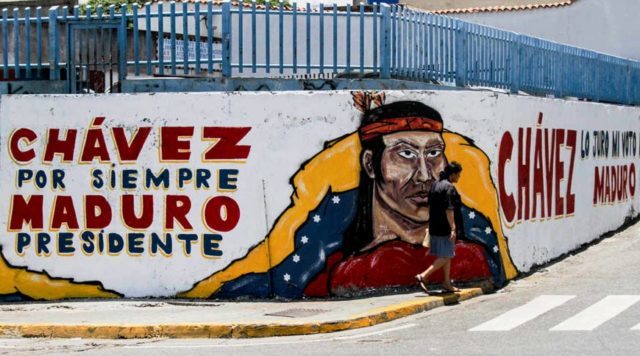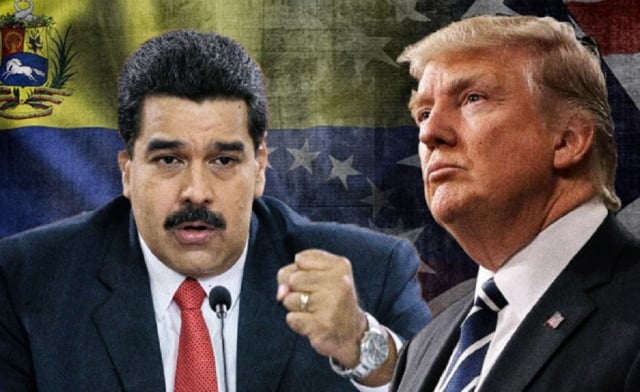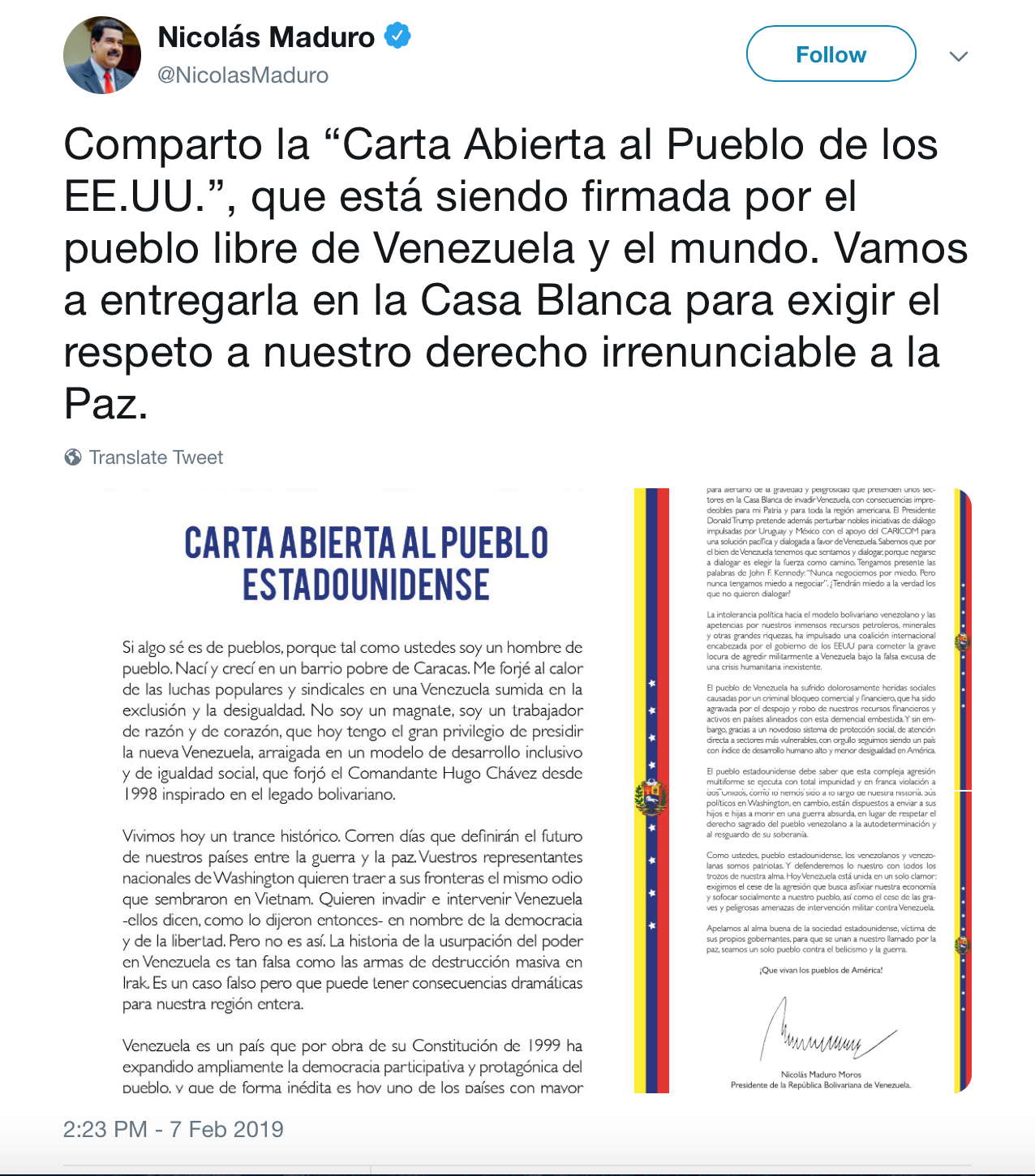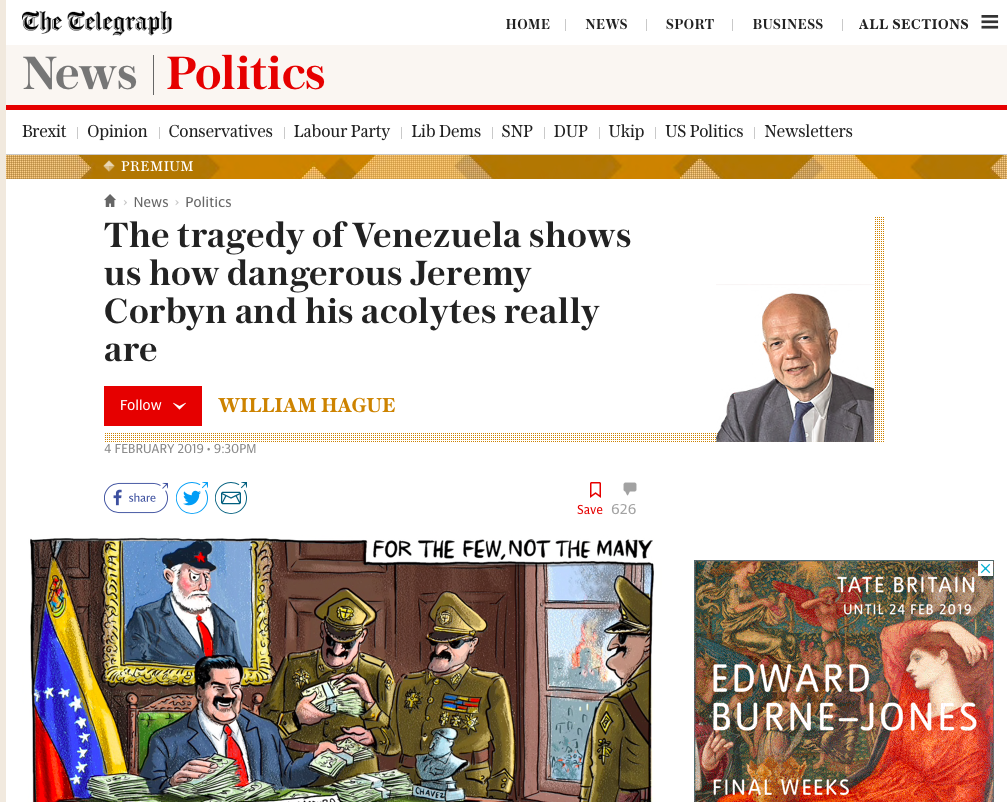Our fear that communism might someday take over most of the world blinds us to the fact that anti-communism already has. – Michael Parenti
It was in the early days of the fighting in Vietnam that a Vietcong officer said to his American prisoner: “You were our heroes after the War. We read American books and saw American films, and a common phrase in those days was “to be as rich and as wise as an American”. What happened?”
An American might have been asked something similar by a Guatemalan, an Indonesian or a Cuban during the ten years previous, or by a Uruguayan, a Chilean or a Greek in the decade subsequent. The remarkable international goodwill and credibility enjoyed by the United States at the close of the Second World War was dissipated country by country, intervention by intervention. The opportunity to build the war-ravaged world anew, to lay the foundations for peace, prosperity and justice, collapsed under the awful weight of anti-communism.

The weight had been accumulating for some time; indeed, since Day One of the Russian Revolution. By the summer of 1918 some 13,000 American troops could be found in the newly-born Union of Soviet Socialist Republics. Two years and thousands of casualties later, the American troops left, having failed in their mission to “strangle at its birth” the Bolshevik state, as Winston Churchill put it.
The young Churchill was Great Britain’s Minister for War and Air during this period. Increasingly, it was he who directed the invasion of the Soviet Union by the Allies (Great Britain, the US, France, Japan and several other nations) on the side of the counter-revolutionary “White Army”. Years later, Churchill the historian was to record his views of this singular affair for posterity:
Were they [the Allies] at war with Soviet Russia? Certainly not; but they shot Soviet Russians at sight. They stood as invaders on Russian soil. They armed the enemies of the Soviet Government. They blockaded its ports, and sunk its battleships. They earnestly desired and schemed its downfall. But war – shocking! Interference – shame! It was, they repeated, a matter of indifference to them how Russians settled their own internal affairs. They were impartial – Bang!
What was there about this Bolshevik Revolution that so alarmed the most powerful nations in the world? What drove them to invade a land whose soldiers had recently fought alongside them for over three years and suffered more casualties than any other country on either side of the World War?
The Bolsheviks had had the audacity to make a separate peace with Germany in order to take leave of a war they regarded as imperialist and not in any way their war, and to try and rebuild a terribly weary and devastated Russia. But the Bolsheviks had displayed the far greater audacity of overthrowing a capitalist-feudal system and proclaiming the first socialist state in the history of the world. This was uppityness writ incredibly large. This was the crime the Allies had to punish, the virus which had to be eradicated lest it spread to their own people.
The invasion did not achieve its immediate purpose, but its consequences were nonetheless profound and persist to the present day. Professor D.F. Fleming, the Vanderbilt University historian of the Cold War, has noted:
For the American people the cosmic tragedy of the interventions in Russia does not exist, or it was an unimportant incident long forgotten. But for the Soviet peoples and their leaders the period was a time of endless killing, of looting and rapine, of plague and famine, of measureless suffering for scores of millions – an experience burned into the very soul of a nation, not to be forgotten for many generations, if ever. Also for many years the harsh Soviet regimentations could all be justified by fear that the capitalist powers would be back to finish the job. It is not strange that in his address in New York, September 17, 1959, Premier Khrushchev should remind us of the interventions, “the time you sent your troops to quell the revolution”, as he put it.
In what could be taken as a portent of superpower insensitivity, a 1920 Pentagon report on the intervention reads: “This expedition affords one of the finest examples in history of honorable, unselfish dealings … under very difficult circumstances to be helpful to a people struggling to achieve a new liberty.”
History does not tell us what a Soviet Union, allowed to develop in a “normal” way of its own choosing, would look like today. We do know, however, the nature of a Soviet Union attacked in its cradle, raised alone in an extremely hostile world, and, when it managed to survive to adulthood, overrun by the Nazi war machine with the blessings of the Western powers. The resulting insecurities and fears have inevitably led to deformities of character not unlike that found in an individual raised in a similar life-threatening manner.
We in the West are never allowed to forget the political shortcomings (real and bogus) of the Soviet Union; at the same time we are never reminded of the history which lies behind it. The anti-communist propaganda campaign began even earlier than the military intervention. Before the year 1918 was over, expressions in the vein of “Red Peril”, “the Bolshevik assault on civilization”, and “menace to world by Reds is seen” had become commonplace in the pages of the New York Times.
During February and March 1919, a US Senate Judiciary Subcommittee held hearings before which many “Bolshevik horror stories” were presented. The character of some of the testimony can be gauged by the headline in the usually sedate Times of 12 February 1919:
DESCRIBE HORRORS UNDER RED RULE. R.E. SIMONS AND W.W. WELSH TELL SENATORS OF BRUTALITIES OF BOLSHEVIKI – STRIP WOMEN IN STREETS – PEOPLE OF EVERY CLASS EXCEPT THE SCUM SUBJECTED TO VIOLENCE BY MOBS.
Historian Frederick Lewis Schuman has written:
“The net result of these hearings … was to picture Soviet Russia as a kind of bedlam inhabited by abject slaves completely at the mercy of an organization of homicidal maniacs whose purpose was to destroy all traces of civilization and carry the nation back to barbarism.”
Literally no story about the Bolsheviks was too contrived, too bizarre, too grotesque, or too perverted to be printed and widely believed – from women being nationalized to babies being eaten (as the early pagans believed the Christians guilty of devouring their children; the same was believed of the Jews in the Middle Ages). The story about women with all the lurid connotations of state property, compulsory marriage, “free love”, etc. “was broadcasted over the country through a thousand channels,” wrote Schuman, “and perhaps did more than anything else to stamp the Russian Communists in the minds of most American citizens as criminal perverts”. This tale continued to receive great currency even after the State Department was obliged to announce that it was a fraud. (That the Soviets eat their babies was still being taught by the John Birch Society to its large audience at least as late as 1978.)
By the end of 1919, when the defeat of the Allies and the White Army appeared likely, the New York Times treated its readers to headlines and stories such as the following:
- 30 Dec. 1919: “Reds Seek War With America”
- 9 Jan. 1920: “‘Official quarters’ describe the Bolshevist menace in the Middle East as ominous”
- 11 Jan. 1920: “Allied officials and diplomats [envisage] a possible invasion of Europe”
- 13 Jan. 1920: “Allied diplomatic circles” fear an invasion of Persia
- 16 Jan. 1920: A page-one headline, eight columns wide:
*"Britain Facing War With Reds, Calls Council In Paris."*
“Well-informed diplomats” expect both a military invasion of Europe and a Soviet advance into Eastern and Southern Asia.
The following morning, however, we could read:
*”No War With Russia, Allies To Trade With Her”*
- 7 Feb. 1920: “Reds Raising Army To Attack India”
- 11 Feb. 1920: “Fear That Bolsheviki Will Now Invade Japanese Territory”
Readers of the New York Times were asked to believe that all these invasions were to come from a nation that was shattered as few nations in history have been; a nation still recovering from a horrendous world war; in extreme chaos from a fundamental social revolution that was barely off the ground; engaged in a brutal civil war against forces backed by the major powers of the world; its industries, never advanced to begin with, in a shambles; and the country in the throes of a famine that was to leave many millions dead before it subsided.
In 1920, The New Republic magazine presented a lengthy analysis of the news coverage by the New York Times of the Russian Revolution and the intervention. Amongst much else, it observed that in the two years following the November 1917 revolution, the Times had stated no less than 91 times that “the Soviets were nearing their rope’s end or actually had reached it.”
If this was reality as presented by the United States’ “newspaper of record”, one can imagine only with dismay the witch’s brew the rest of the nation’s newspapers were feeding to their readers.
This, then, was the American people’s first experience of a new social phenomenon that had come upon the world, their introductory education about the Soviet Union and this thing called “communism”. The students have never recovered from the lesson. Neither has the Soviet Union.
The military intervention came to an end but, with the sole and partial exception of the Second World War period, the propaganda offensive has never let up. In 1943 Life magazine devoted an entire issue in honor of the Soviet Union’s accomplishments, going far beyond what was demanded by the need for wartime solidarity, going so far as to call Lenin “perhaps the greatest man of modern times”. Two years later, however, with Harry Truman sitting in the White House, such fraternity had no chance of surviving. Truman, after all, was the man who, the day after the Nazis invaded the Soviet Union, said: “If we see that Germany is winning, we ought to help Russia, and if Russia is winning, we ought to help Germany, and that way let them kill as many as possible, although I don’t want to see Hitler victorious in any circumstances.”
Much propaganda mileage has been squeezed out of the Soviet-German treaty of 1939, made possible only by entirely ignoring the fact that the Russians were forced into the pact by the repeated refusal of the Western powers, particularly the United States and Great Britain, to unite with Moscow in a stand against Hitler; as they likewise refused to come to the aid of the socialist-oriented Spanish government under siege by the German, Italian and Spanish fascists beginning in 1936. Stalin realized that if the West wouldn’t save Spain, they certainly wouldn’t save the Soviet Union.
From the Red Scare of the 1920s to the McCarthyism of the 1950s to the Reagan Crusade against the Evil Empire of the 1980s, the American people have been subjected to a relentless anti-communist indoctrination. It is imbibed with their mother’s milk, pictured in their comic books, spelled out in their school books; their daily paper offers them headlines that tell them all they need to know; ministers find sermons in it, politicians are elected with it, and Reader’s Digest becomes rich on it.
The fiercely-held conviction inevitably produced by this insidious assault upon the intellect is that a great damnation has been unleashed upon the world, possibly by the devil himself, but in the form of people; people not motivated by the same needs, fears, emotions, and personal morality that govern others of the species, but people engaged in an extremely clever, monolithic, international conspiracy dedicated to taking over the world and enslaving it; for reasons not always clear perhaps, but evil needs no motivation save evil itself. Moreover, any appearance or claim by these people to be rational human beings seeking a better kind of world or society is a sham, a cover-up, to delude others, and proof only of their cleverness; the repression and cruelties which have taken place in the Soviet Union are forever proof of the bankruptcy of virtue and the evil intentions of these people in whichever country they may be found, under whatever name they may call themselves; and, most important of all, the only choice open to anyone in the United States is between the American Way of Life and the Soviet Way of Life, that nothing lies between or beyond these two ways of making the world.
This is how it looks to the simple folk of America. One finds that the sophisticated, when probed slightly beneath the surface of their academic language, see it exactly the same way.
To the mind carefully brought to adulthood in the United States, the truths of anti-communism are self-evident, as self-evident as the flatness of the world once was to an earlier mind; as the Russian people believed that the victims of Stalin’s purges were truly guilty of treason.
The foregoing slice of American history must be taken into account if one is to make sense of the vagaries of American foreign policy since the end of World War II, specifically the record, as presented in this book, of what the US military and the CIA and other branches of the US government have done to the peoples of the world.
In 1918, the barons of American capital needed no reason for their war against communism other than the threat to their wealth and privilege, although their opposition was expressed in terms of moral indignation.
During the period between the two world wars, US gunboat diplomacy operated in the Caribbean to make “The American Lake” safe for the fortunes of United Fruit and W.R. Grace & Co., at the same time taking care to warn of “the Bolshevik threat” to all that is decent from the likes of Nicaraguan rebel Augusto Sandino.
By the end of the Second World War, every American past the age of 40 had been subjected to some 25 years of anti-communist radiation, the average incubation period needed to produce a malignancy. Anti-communism had developed a life of its own, independent of its capitalist father. Increasingly, in the post-war period, middle-aged Washington policy makers and diplomats saw the world out there as one composed of “communists” and “anti-communists”, whether of nations, movements or individuals. This comic-strip vision of the world, with righteous American supermen fighting communist evil everywhere, had graduated from a cynical propaganda exercise to a moral imperative of US foreign policy.
Even the concept of “non-communist”, implying some measure of neutrality, has generally been accorded scant legitimacy in this paradigm. John Foster Dulles, one of the major architects of post-war US foreign policy, expressed this succinctly in his typically simple, moralistic way: “For us there are two sorts of people in the world: there are those who are Christians and support free enterprise and there are the others.” As several of the case studies in the present book confirm, Dulles put that creed into rigid practice.
The word “communist” (as well as “Marxist”) has been so overused and so abused by American leaders and the media as to render it virtually meaningless. (The Left has done the same to the word “fascist”.) But merely having a name for something – witches or flying saucers – attaches a certain credence to it.
At the same time, the American public, as we have seen, has been soundly conditioned to react Pavlovianly to the term: it means, still, the worst excesses of Stalin, from wholesale purges to Siberian slave-labor camps; it means, as Michael Parenti has observed, that “Classic Marxist-Leninist predictions [concerning world revolution] are treated as statements of intent directing all present-day communist actions.” It means “us” against “them”.
And “them” can mean a peasant in the Philippines, a mural-painter in Nicaragua, a legally-elected prime minister in British Guiana, or a European intellectual, a Cambodian neutralist, an African nationalist – all, somehow, part of the same monolithic conspiracy; each, in some way, a threat to the American Way of Life; no land too small, too poor, or too far away to pose such a threat, the “communist threat”.
The cases presented in this book illustrate that it has been largely irrelevant whether the particular targets of intervention – be they individuals, political parties, movements or governments – called themselves “communist” or not. It has mattered little whether they were scholars of dialectical materialism or had never heard of Karl Marx; whether they were atheists or priests; whether a strong and influential Communist Party was in the picture or not; whether the government had come into being through violent revolution or peaceful elections … all have been targets, all “communists”.
It has mattered still less that the Soviet KGB was in the picture. The assertion has been frequently voiced that the CIA carries out its dirty tricks largely in reaction to operations of the KGB which have been “even dirtier”. This is a lie made out of whole cloth. There may be an isolated incident of such in the course of the CIA’s life, but it has kept itself well hidden. The relationship between the two sinister agencies is marked by fraternization and respect for fellow professionals more than by hand-to-hand combat. Former CIA officer John Stockwell has written:
Actually, at least in more routine operations, case officers most fear the US ambassador and his staff, then restrictive headquarters cables, then curious, gossipy neighbors in the local community, as potential threats to operations. Next would come the local police, then the press. Last of all is the KGB – in my twelve years of case officering I never saw or heard of a situation in which the KGB attacked or obstructed a CIA operation.
Stockwell adds that the various intelligence services do not want their world to be “complicated” by murdering each other.
It isn’t done. If a CIA case officer has a flat tire in the dark of night on a lonely road, he will not hesitate to accept a ride from a KGB officer – likely the two would detour to some bar for a drink together. In fact CIA and KGB officers entertain each other frequently in their homes. The CIA’s files are full of mention of such relationships in almost every African station.
Proponents of “fighting fire with fire” come perilously close at times to arguing that if the KGB, for example, had a hand in the overthrow of the Czechoslovak government in 1968, it is OK for the CIA to have a hand in the overthrow of the Chilean government in 1973. It’s as if the destruction of democracy by the KGB deposits funds in a bank account from which the CIA is then justified in making withdrawals.
What then has been the thread common to the diverse targets of American intervention which has brought down upon them the wrath, and often the firepower, of the world’s most powerful nation? In virtually every case involving the Third World described in this book, it has been, in one form or another, a policy of “self-determination”: the desire, born of perceived need and principle, to pursue a path of development independent of US foreign policy objectives. Most commonly, this has been manifested in (a) the ambition to free themselves from economic and political subservience to the United States; (b) the refusal to minimize relations with the socialist bloc, or suppress the left at home, or welcome an American military installation on their soil; in short, a refusal to be a pawn in the Cold War; or (c) the attempt to alter or replace a government which held to neither of these aspirations; i.e., a government supported by the United States.
It cannot be emphasized too strongly that such a policy of independence has been viewed and expressed by numerous Third World leaders and revolutionaries as one not to be equated by definition to anti-Americanism or pro-communism, but as simply a determination to maintain a position of neutrality and non-alignment vis-a-vis the two superpowers. Time and time again, however, it will be seen that the United States was not prepared to live with this proposition. Arbenz of Guatemala, Mossadegh of Iran, Sukarno of Indonesia, Nkrumah of Ghana, Jagan of British Guiana, Sihanouk of Cambodia … all, insisted Uncle Sam, must declare themselves unequivocally on the side of “The Free World” or suffer the consequences. Nkrumah put the case for non-alignment as follows:
The experiment which we tried in Ghana was essentially one of developing the country in co-operation with the world as a whole. Non-alignment meant exactly what it said. We were not hostile to the countries of the socialist world in the way in which the governments of the old colonial territories were. It should be remembered that while Britain pursued at home co-existence with the Soviet Union this was never allowed to extend to British colonial territories. Books on socialism, which were published and circulated freely in Britain, were banned in the British colonial empire, and after Ghana became independent it was assumed abroad that it would continue to follow the same restrictive ideological approach. When we behaved as did the British in their relations with the socialist countries we were accused of being pro-Russian and introducing the most dangerous ideas into Africa.
It is reminiscent of the 19th-century American South, where many Southerners were deeply offended that so many of their black slaves had deserted to the Northern side in the Civil War. They had genuinely thought that the blacks should have been grateful for all their white masters had done for them, and that they were happy and content with their lot. The noted Louisiana surgeon and psychologist Dr. Samuel A. Cartwright argued that many of the slaves suffered from a form of mental illness, which he called “drapetomania”, diagnosed as the uncontrollable urge to escape from slavery. In the second half of the 20th-century, this illness, in the Third World, has usually been called “communism”.
Perhaps the most deeply ingrained reflex of knee-jerk anti-communism is the belief that the Soviet Union (or Cuba or Vietnam, etc., acting as Moscow’s surrogate) is a clandestine force lurking behind the facade of self-determination, stirring up the hydra of revolution, or just plain trouble, here, there, and everywhere; yet another incarnation, although on a far grander scale, of the proverbial “outside agitator”, he who has made his appearance regularly throughout history … King George blamed the French for inciting the American colonies to revolt … disillusioned American farmers and veterans protesting their onerous economic circumstances after the revolution (Shays’ Rebellion) were branded as British agents out to wreck the new republic … labor strikes in late-19th-century America were blamed on “anarchists” and “foreigners”, during the First World War on “German agents”, after the war on “Bolsheviks”.
And in the 1960s, said the National Commission on the Causes and Prevention of Violence, J. Edgar Hoover “helped spread the view among the police ranks that any kind of mass protest is due to a conspiracy promulgated by agitators, often Communists, ‘who misdirect otherwise contented people’.” (The full quotation is from the New York Times, 11 January 1969, p. 1; the inside quotation is that of the National Commission.)
The last is the key phrase, one which encapsulates the conspiracy mentality of those in power – the idea that no people, except those living under the enemy, could be so miserable and discontent as to need recourse to revolution or even mass protest; that it is only the agitation of the outsider which misdirects them along this path.
Accordingly, if Ronald Reagan were to concede that the masses of El Salvador have every good reason to rise up against their god-awful existence, it would bring into question his accusation, and the rationale for US intervention, that it is principally (only?) the Soviet Union and its Cuban and Nicaraguan allies who instigate the Salvadoreans: that seemingly magical power of communists everywhere who, with a twist of their red wrist, can transform peaceful, happy people into furious guerrillas. The CIA knows how difficult a feat this is. The Agency, as we shall see, tried to spark mass revolt in China, Cuba, the Soviet Union, Albania, and elsewhere in Eastern Europe with a singular lack of success. The Agency’s scribes have laid the blame for these failures on the “closed” nature of the societies involved. But in non-communist countries, the CIA has had to resort to military coups or extra-legal chicanery to get its people into power. It has never been able to light the fire of popular revolution.
For Washington to concede merit and virtue to a particular Third World insurgency would, moreover, raise the question: Why does not the United States, if it must intervene, take the side of the rebels? Not only might this better serve the cause of human rights and justice, but it would shut out the Russians from their alleged role. What better way to frustrate the International Communist Conspiracy? But this is a question that dares not speak its name in the Oval Office, a question that is relevant to many of the cases in this book.
Instead, the United States remains committed to its all-too-familiar policy of establishing and/or supporting the most vile tyrannies in the world, whose outrages against their own people confront us daily in the pages of our newspapers: brutal massacres; systematic, sophisticated torture; public whippings; soldiers and police firing into crowds; government-supported death squads; tens of thousands of disappeared persons; extreme economic deprivation … a way of life that is virtually a monopoly held by America’s allies, from Guatemala, Chile and El Salvador to Turkey, Pakistan and Indonesia, all members in good standing of the Holy War Against Communism, all members of “The Free World”, that region of which we hear so much and see so little.
The restrictions on civil liberties found in the communist bloc, as severe as they are, pale by comparison to the cottage-industry Auschwitzes of “The Free World”, and, except in that curious mental landscape inhabited by The Compleat Anti-Communist, can have little or nothing to do with the sundry American interventions supposedly in the cause of a higher good.
It is interesting to note that as commonplace as it is for American leaders to speak of freedom and democracy while supporting dictatorships, so do Russian leaders speak of wars of liberation, anti-imperialism and anti-colonialism while doing extremely little to actually further these causes, American propaganda notwithstanding. The Soviets like to be thought of as champions of the Third World, but they have stood by doing little more than going “tsk, tsk” as progressive movements and governments, even Communist Parties, in Greece, Guatemala, British Guiana, Chile, Indonesia, the Philippines and elsewhere have gone to the wall with American complicity.
During the early 1950s, the Central Intelligence Agency instigated several military incursions into Communist China. In 1960, CIA planes, without any provocation, bombed the sovereign nation of Guatemala. In 1973, the Agency encouraged a bloody revolt against the government of Iraq. In the American mass media at the time, and therefore in the American mind, these events did not happen.
“We didn’t know what was happening”, became a cliché used to ridicule those Germans who claimed ignorance of the events which took place under the Nazis. Yet, was their stock answer as far-fetched as we’d like to think? It is sobering to reflect that in our era of instant world-wide communications, the United States has, on many occasions, been able to mount a large- or small-scale military operation or undertake another, equally blatant, form of intervention without the American public being aware of it until years later, if ever. Often the only report of the event or of US involvement was a passing reference to the fact that a communist government had made certain charges – just the kind of “news” the American public has been well conditioned to dismiss out of hand, and the press not to follow up; as the German people were taught that reports from abroad of Nazi wrong-doings were no more than communist propaganda.
With few exceptions, the interventions never made the headlines or the evening TV news. With some, bits and pieces of the stories have popped up here and there, but rarely brought together to form a cohesive and enlightening whole; the fragments usually appear long after the fact, quietly buried within other stories, just as quietly forgotten, bursting into the foreground only when extraordinary circumstances have compelled it, such as the Iranians holding US embassy personnel and other Americans hostage in Teheran in 1979, which produced a rash of articles on the role played by the United States in the overthrow of the Iranian government in 1953. It was as if editors had been spurred into thinking: “Hey, just what did we do in Iran to make all those people hate us so?”
There have been a lot of Irans in America’s recent past, but in the absence of the New York Daily Newsor the Los Angeles Times conspicuously grabbing the reader by the collar and pressing against his face the full implication of the deed … in the absence of NBC putting it all into real pictures of real people on the receiving end … in such absence the incidents become non-events for the large majority of Americans, and they can honestly say “We didn’t know what was happening.”
Former Chinese Premier Chou En-lai once observed: “One of the delightful things about Americans is that they have absolutely no historical memory.”
It’s probably even worse than he realized. During the Three Mile Island nuclear power plant accident in Pennsylvania in 1979, a Japanese journalist, Atsuo Kaneko of the Japanese Kyoto News Service, spent several hours interviewing people temporarily housed at a hockey rink – mostly children, pregnant women and young mothers. He discovered that none of them had heard of Hiroshima. Mention of the name drew a blank.
And in 1982, a judge in Oakland, California said he was appalled when some 50 prospective jurors for a death-penalty murder trial were questioned and “none of them knew who Hitler was”.
To the foreign policy oligarchy in Washington, it is more than delightful. It is sine qua non.
So obscured is the comprehensive record of American interventions that when, in 1975, the Congressional Research Service of the Library of Congress was asked to undertake a study of covert activities of the CIA to date, it was able to come up with but a very minor portion of the overseas incidents presented in this book for the same period.
For all of this information that has made its way into popular consciousness, or into school texts, encyclopedias, or other standard reference works, there might as well exist strict censorship in the United States.
The reader is invited to look through the relevant sections of the three principal American encyclopedias: Americana, Britannica, and Colliers. The image of encyclopedias as the final repository of objective knowledge takes a beating. What is tantamount to a non-recognition of American interventions may very well be due to these esteemed works employing a criterion similar to that of Washington officials as reflected in the Pentagon Papers. The New York Times summarized this highly interesting phenomenon thusly:
Clandestine warfare against North Vietnam, for example, is not seen … as violating the Geneva Accords of 1954, which ended the French Indochina War, or as conflicting with the public policy pronouncements of the various administrations. Clandestine warfare, because it is covert, does not exist as far as treaties and public posture are concerned. Further, secret commitments to other nations are not sensed as infringing on the treaty-making powers of the Senate, because they are not publicly acknowledged.
The de facto censorship which leaves so many Americans functionally illiterate about the history of US foreign affairs may be all the more effective because it is not so much official, heavy-handed or conspiratorial, as it is woven artlessly into the fabric of education and media. No conspiracy is needed. The editors of Reader’s Digest and U.S. News and World Report do not need to meet covertly with the representative from NBC in an FBI safe-house to plan next month’s stories and programs; for the simple truth is that these individuals would not have reached the positions they occupy if they themselves had not all been guided through the same tunnel of camouflaged history and emerged with the same selective memory and conventional wisdom.
“The upheaval in China is a revolution which, if we analyze it, we will see is prompted by the same things that prompted the British, French and American revolutions.” A cosmopolitan and generous sentiment of Dean Rusk, then Assistant Secretary for Far Eastern Affairs, later Secretary of State. At precisely the same time as Mr. Rusk’s talk in 1950, others in his government were actively plotting the downfall of the Chinese revolutionary government.
This has been a common phenomenon. For many of the cases described in the following pages, one can find statements of high or middle-level Washington officials which put into question the policy of intervention; which expressed misgivings based either on principle (sometimes the better side of American liberalism) or concern that the intervention would not serve any worthwhile end, might even result in disaster. I have attached little weight to such dissenting statements as, indeed, in the final analysis, did Washington decision-makers who, in controversial world situations, could be relied upon to play the anti-communist card. In presenting the interventions in this manner, I am declaring that American foreign policy is what American foreign policy does.
Excerpts from the Introduction, 1995 edition
In 1993, I came across a review of a book about people who deny that the Nazi Holocaust actually occurred. I wrote to the author, a university professor, telling her that her book made me wonder whether she knew that an American holocaust had taken place, and that the denial of it put the denial of the Nazi one to shame. So broad and deep is the denial of the American holocaust, I said, that the denyers are not even aware that the claimers or their claim exist. Yet, a few million people have died in the American holocaust and many more millions have been condemned to lives of misery and torture as a result of US interventions extending from China and Greece in the 1940s to Afghanistan and Iraq in the 1990s. I enclosed a listing of these interventions, which is of course the subject of the present book.
In my letter I also offered to exchange a copy of the earlier edition of my book for a copy of hers, but she wrote back informing me that she was not in a position to do so. And that was all she said. She made no comment whatsoever about the remainder of my letter – the part dealing with denying the American holocaust – not even to acknowledge that I had raised the matter. The irony of a scholar on the subject of denying the Nazi Holocaust engaging in such denial about the American holocaust was classic indeed. I was puzzled why the good professor had bothered to respond at all.
Clearly, if my thesis could receive such a non-response from such a person, I and my thesis faced an extremely steep uphill struggle. In the 1930s, and again after the war in the 1940s and ’50s, anti-communists of various stripes in the United States tried their best to expose the crimes of the Soviet Union, such as the purge trials and the mass murders. But a strange thing happened. The truth did not seem to matter. American Communists and fellow travelers continued to support the Kremlin. Even allowing for the exaggeration and disinformation regularly disbursed by the anti-communists which damaged their credibility, the continued ignorance and/or denial by the American leftists is remarkable.
At the close of the Second World War, when the victorious Allies discovered the German concentration camps, in some cases German citizens from nearby towns were brought to the camp to come face-to-face with the institution, the piles of corpses, and the still-living skeletal people; some of the respectable burghers were even forced to bury the dead. What might be the effect upon the American psyche if the true-believers and denyers were compelled to witness the consequences of the past half-century of US foreign policy close up? What if all the nice, clean-cut, wholesome American boys who dropped an infinite tonnage of bombs, on a dozen different countries, on people they knew nothing about – characters in a video game – had to come down to earth and look upon and smell the burning flesh?
It has become conventional wisdom that it was the relentlessly tough anti-communist policies of the Reagan Administration, with its heated-up arms race, that led to the collapse and reformation of the Soviet Union and its satellites. American history books may have already begun to chisel this thesis into marble. The Tories in Great Britain say that Margaret Thatcher and her unflinching policies contributed to the miracle as well. The East Germans were believers too. When Ronald Reagan visited East Berlin, the people there cheered him and thanked him “for his role in liberating the East”. Even many leftist analysts, particularly those of a conspiracy bent, are believers.
But this view is not universally held; nor should it be.
Long the leading Soviet expert on the United States, Georgi Arbatov, head of the Moscow-based Institute for the Study of the U.S.A. and Canada, wrote his memoirs in 1992. A Los Angeles Times book review by Robert Scheer summed up a portion of it:
Arbatov understood all too well the failings of Soviet totalitarianism in comparison to the economy and politics of the West. It is clear from this candid and nuanced memoir that the movement for change had been developing steadily inside the highest corridors of power ever since the death of Stalin. Arbatov not only provides considerable evidence for the controversial notion that this change would have come about without foreign pressure, he insists that the U.S. military buildup during the Reagan years actually impeded this development.
George F. Kennan agrees. The former US ambassador to the Soviet Union, and father of the theory of “containment” of the same country, asserts that “the suggestion that any United States administration had the power to influence decisively the course of a tremendous domestic political upheaval in another great country on another side of the globe is simply childish.” He contends that the extreme militarization of American policy strengthened hard-liners in the Soviet Union. “Thus the general effect of Cold War extremism was to delay rather than hasten the great change that overtook the Soviet Union.”
Though the arms-race spending undoubtedly damaged the fabric of the Soviet civilian economy and society even more than it did in the United States, this had been going on for 40 years by the time Mikhail Gorbachev came to power without the slightest hint of impending doom. Gorbachev’s close adviser, Aleksandr Yakovlev, when asked whether the Reagan administration’s higher military spending, combined with its “Evil Empire” rhetoric, forced the Soviet Union into a more conciliatory position, responded:
It played no role. None. I can tell you that with the fullest responsibility. Gorbachev and I were ready for changes in our policy regardless of whether the American president was Reagan, or Kennedy, or someone even more liberal. It was clear that our military spending was enormous and we had to reduce it.
Understandably, some Russians might be reluctant to admit that they were forced to make revolutionary changes by their arch enemy, to admit that they lost the Cold War. However, on this question we don’t have to rely on the opinion of any individual, Russian or American. We merely have to look at the historical facts.
From the late 1940s to around the mid-1960s, it was an American policy objective to instigate the downfall of the Soviet government as well as several Eastern European regimes. Many hundreds of Russian exiles were organized, trained and equipped by the CIA, then sneaked back into their homeland to set up espionage rings, to stir up armed political struggle, and to carry out acts of assassination and sabotage, such as derailing trains, wrecking bridges, damaging arms factories and power plants, and so on. The Soviet government, which captured many of these men, was of course fully aware of who was behind all this.
Compared to this policy, that of the Reagan administration could be categorized as one of virtual capitulation. Yet what were the fruits of this ultra-tough anti-communist policy? Repeated serious confrontations between the United States and the Soviet Union in Berlin, Cuba and elsewhere, the Soviet interventions into Hungary and Czechoslovakia, creation of the Warsaw Pact (in direct reaction to NATO), no glasnost, no perestroika, only pervasive suspicion, cynicism and hostility on both sides. It turned out that the Russians were human after all – they responded to toughness with toughness. And the corollary: there was for many years a close correlation between the amicability of US-Soviet relations and the number of Jews allowed to emigrate from the Soviet Union. Softness produced softness.
If there’s anyone to attribute the changes in the Soviet Union and Eastern Europe to, both the beneficial ones and those questionable, it is of course Mikhail Gorbachev and the activists he inspired. It should be remembered that Reagan was in office for over four years before Gorbachev came to power, and Thatcher for six years, but in that period of time nothing of any significance in the way of Soviet reform took place despite Reagan’s and Thatcher’s unremitting malice toward the communist state.
The argument is frequently advanced that it’s easy in hindsight to disparage the American cold-war mania for a national security state – with all its advanced paranoia and absurdities, its NATO-supra-state-military juggernaut, its early-warning systems and air-raid drills, its nuclear silos and U-2s – but that after the War in Europe the Soviets did indeed appear to be a ten-foot-tall world-wide monster threat.
This argument breaks up on the rocks of a single question, which was all one had to ask back then: Why would the Soviets want to invade Western Europe or bomb the United States? They clearly had nothing to gain by such actions except the almost certain destruction of their country, which they were painstakingly rebuilding once again after the devastation of the war.
By the 1980s, the question that still dared not be asked had given birth to a $300 billion military budget and Star Wars.
There are available, in fact, numerous internal documents from the State Department, the Defense Department, and the CIA from the postwar period, wherein one political analyst after another makes clear his serious skepticism of “The Soviet Threat” – revealing the Russians’ critical military weaknesses and/or questioning their alleged aggressive intentions – while high officials, including the president, were publicly presenting a message explicitly the opposite.
Historian Roger Morris, former member of the National Security Council under Presidents Johnson and Nixon, described this phenomenon:
Architects of U.S. policy would have to make their case “clearer than the truth,” and “bludgeon the mass mind of top government,” as Secretary of State Dean Acheson … puts it. They do. The new Central Intelligence Agency begins a systematic overstatement of Soviet military expenditures. Magically, the sclerotic Soviet economy is made to hum and climb on U.S. government charts. To Stalin’s horse-drawn army – complete with shoddy equipment, war-torn roads and spurious morale – the Pentagon adds phantom divisions, then attributes invasion scenarios to the new forces for good measure.
U.S. officials “exaggerated Soviet capabilities and intentions to such an extent,” says a subsequent study of the archives, “that it is surprising anyone took them seriously.” Fed by somber government claims and reverberating public fear, the U.S. press and people have no trouble.
Nonetheless, the argument insists, there were many officials in high positions who simply and sincerely misunderstood the Soviet signals. The Soviet Union was, after all, a highly oppressive and secretive society, particularly before Stalin died in 1953. Apropos of this, former conservative member of the British Parliament Enoch Powell observed in 1983:
International misunderstanding is almost wholly voluntary: it is that contradiction in terms, intentional misunderstanding – a contradiction, because in order to misunderstand deliberately, you must at least suspect if not actually understand what you intend to misunderstand. … [The US misunderstanding of the USSR has] the function of sustaining a myth – the myth of the United States as “the last, best hope of mankind.” St. George and the Dragon is a poor show without a real dragon, the bigger and scalier the better, ideally with flames coming out of its mouth. The misunderstanding of Soviet Russia has become indispensable to the self-esteem of the American nation: he will not be regarded with benevolence who seeks, however ineffectually, to deprive them of it.
It can be argued as well that the belief of the Nazis in the great danger posed by the “International Jewish Conspiracy” must be considered before condemning the perpetrators of the Holocaust.
Both the Americans and the Germans believed their own propaganda, or pretended to. In reading Mein Kampf, one is struck by the fact that a significant part of what Hitler wrote about Jews reads very much like an American anti-communist writing about communists: He starts with the premise that the Jews (communists) are evil and want to dominate the world; then, any behavior which appears to contradict this is regarded as simply a ploy to fool people and further their evil ends; this behavior is always part of a conspiracy and many people are taken in. He ascribes to the Jews great, almost mystical, power to manipulate societies and economies. He blames Jews for the ills arising from the industrial revolution, e.g., class divisions and hatred. He decries the Jews’ internationalism and lack of national patriotism.
There were of course those Cold Warriors whose take on the Kremlin was that its master plan for world domination was nothing so gross as an invasion of Western Europe or dropping bombs on the United States. The ever more subtle – one could say fiendishly-clever – plan was for subversion … from the inside … country by country … throughout the Third World … eventually surrounding and strangling the First World … verily an International Communist Conspiracy, “a conspiracy,” said Senator Joseph McCarthy, “on a scale so immense as to dwarf any previous such venture in the history of man.”
This is the primary focus of this book: how the United States intervened all over the world to combat this conspiracy wherever and whenever it reared its ugly head.
Did this International Communist Conspiracy actually exist?
If it actually existed, why did the Cold Warriors of the CIA and other government agencies have to go to such extraordinary lengths of exaggeration? If they really and truly believed in the existence of a diabolic, monolithic International Communist Conspiracy, why did they have to invent so much about it to convince the American people, the Congress, and the rest of the world of its evil existence? Why did they have to stage manage, entrap, plant evidence, plant stories, create phony documents? The following pages are packed with numerous anti-commiespeak examples of US-government and media inventions about “the Soviet threat”, “the Chinese threat”, and “the Cuban threat”. And all the while, at the same time, we were being flailed with scare stories: in the 1950s, there was “the Bomber Gap” between the US and the Soviet Union, and the “civil defense gap”. Then came “the Missile Gap”. Followed by “the Anti-ballistic missile (ABM) Gap”. In the 1980s, it was “the Spending Gap”. Finally, “the Laser Gap”. And they were all lies.
We now know that the CIA of Ronald Reagan and William Casey regularly “politicized intelligence assessments” to support the anti-Soviet bias of their administration, and suppressed reports, even those from its own analysts, which contradicted this bias. We now know that the CIA and the Pentagon regularly overestimated the economic and military strength of the Soviet Union, and exaggerated the scale of Soviet nuclear tests and the number of “violations” of existing test-ban treaties, which Washington then accused the Russians of. All to create a larger and meaner enemy, a bigger national security budget, and give security and meaning to the Cold Warriors’ own jobs.
Post-Cold War, New-World-Order time, it looks good for the military-Industrial- Intelligence Complex and their global partners in crime, the World Bank and the IMF. They’ve got their NAFTA, and soon their World Trade Organization. They’re dictating economic, political and social development all over the Third World and Eastern Europe. Moscow’s reaction to events anywhere is no longer a restraining consideration. The UN’s Code of Conduct on Transnational Corporations, 15 years in the making, is dead. Everything in sight is being deregulated and privatized. Capital prowls the globe with a ravenous freedom it hasn’t enjoyed since before World War I, operating free of friction, free of gravity. The world has been made safe for the transnational corporation.
Will this mean any better life for the multitudes than the Cold War brought? Any more regard for the common folk than there’s been since they fell off the cosmic agenda centuries ago? “By all means,” says Capital, offering another warmed-up version of the “trickle down” theory, the principle that the poor, who must subsist on table scraps dropped by the rich, can best be served by giving the rich bigger meals.
The boys of Capital, they also chortle in their martinis about the death of socialism. The word has been banned from polite conversation. And they hope that no one will notice that every socialist experiment of any significance in the twentieth century – without exception – has either been crushed, overthrown, or invaded, or corrupted, perverted, subverted, or destabilized, or otherwise had life made impossible for it, by the United States. Not one socialist government or movement – from the Russian Revolution to the Sandinistas in Nicaragua, from Communist China to the FMLN in Salvador – not one was permitted to rise or fall solely on its own merits; not one was left secure enough to drop its guard against the all-powerful enemy abroad and freely and fully relax control at home.
It’s as if the Wright brothers’ first experiments with flying machines all failed because the automobile interests sabotaged each test flight. And then the good and god-fearing folk of the world looked upon this, took notice of the consequences, nodded their collective heads wisely, and intoned solemnly: Man shall never fly.
*
This is a chapter from Killing Hope: U.S. Military and CIA Interventions Since World War II by William Blum.
Note to readers: please click the share buttons below. Forward this article to your email lists. Crosspost on your blog site, internet forums. etc.
Sources

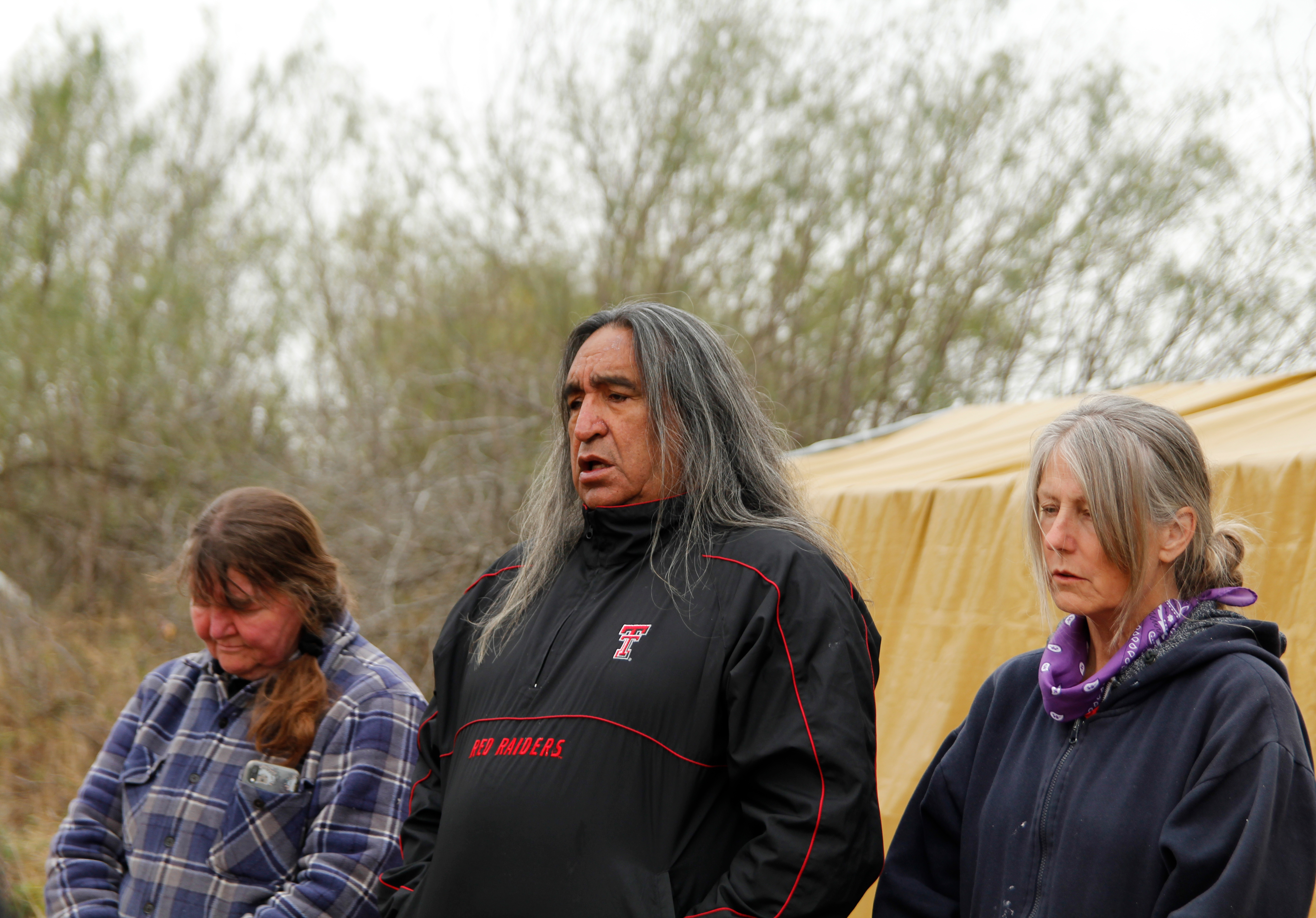
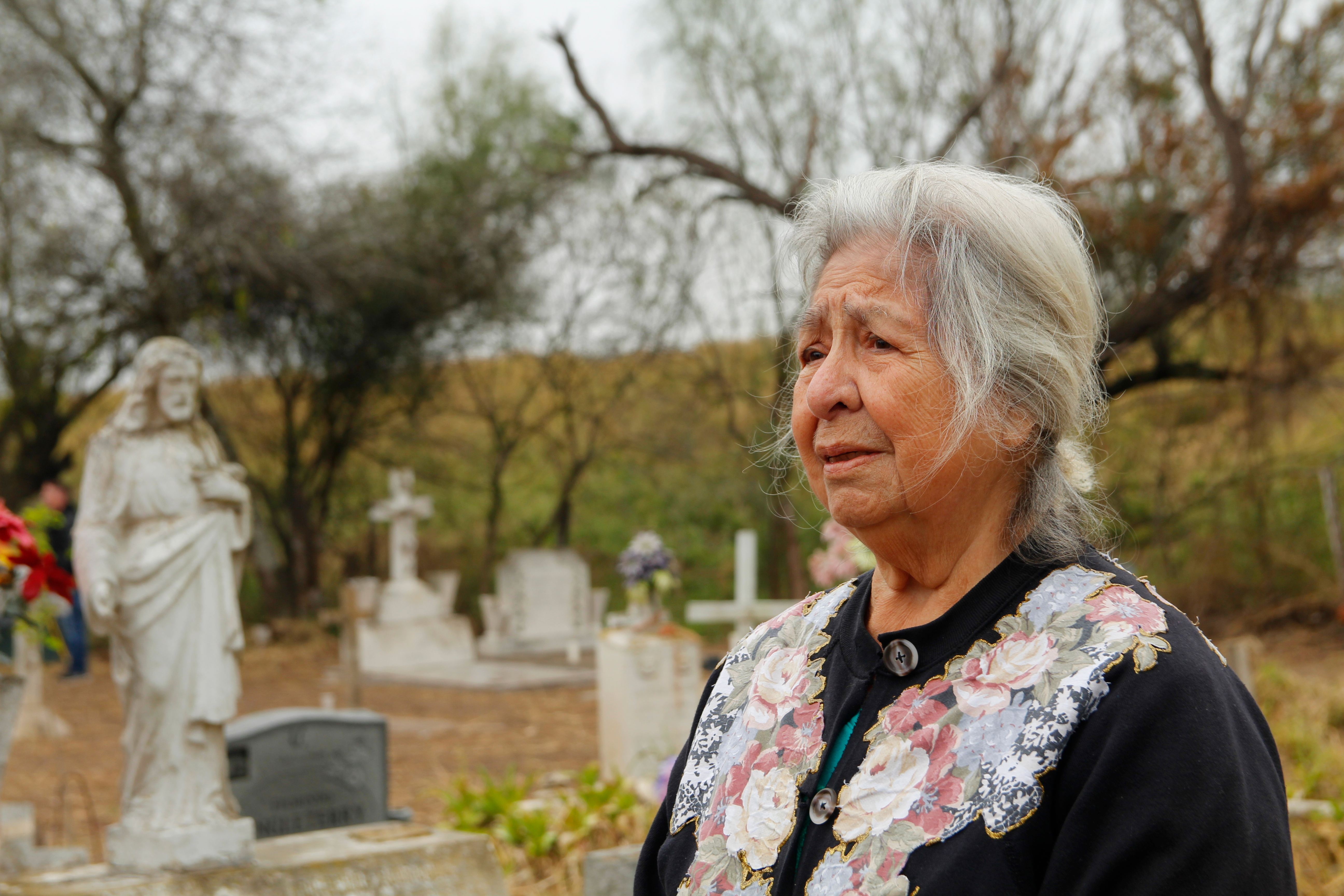
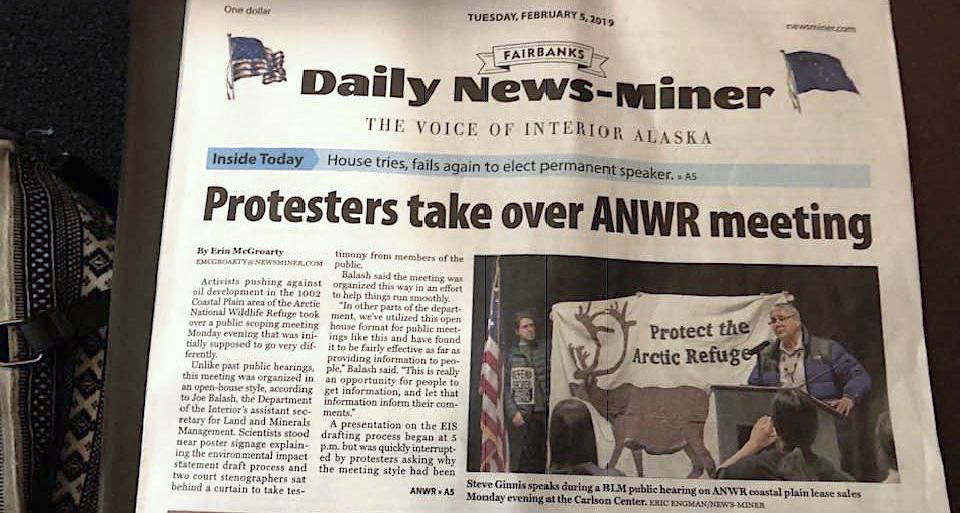

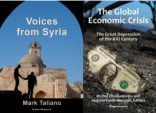 All new members (annual basis) as well as all membership renewal (annual basis) will receive a FREE copy of
All new members (annual basis) as well as all membership renewal (annual basis) will receive a FREE copy of  lobal Research Monthly Membership – $9.50/month
lobal Research Monthly Membership – $9.50/month








